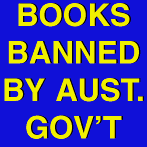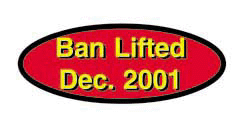|
HOSER - TWO MORE BOOKS UNBANNED!!!…..
December 19 2001
|

 Australia's most frequently banned author, Raymond Hoser has had yet another two of his best-selling books "unbanned".
Australia's most frequently banned author, Raymond Hoser has had yet another two of his best-selling books "unbanned".
Victoria Police Corruption and Victoria Police Corruption - 2, were released in July/August 1999 and took Victoria by storm.
A year later the Labor government of Victoria decided that the general public had no right to know the truth and wrote to bookshops and distributors across Australia threatening to jail anyone who dared sell the books.
The ban on sales was nearly watertight, although there were a few shops that defied it and they continued to sell sizeable numbers of book to an information hungry public.
Following this, in May 2001, Hoser and his publishing company, Kotabi, were charged with the ancient crime of "Scandalizing the courts" by publishing the truth about legal corruption.
In what was best described as a show trial, Hoser and company were convicted over the second book.
Hoser's side was unable to use truth as a legal defence and the case was heard by a close legal colleague of the man who charged Hoser.
In fact the judge who convicted Hoser and his company (Geoffrey Eames) was in the direct employment of the man who charged him (Rob Justin Hulls). The judgement was replete with factual and legal errors to such a degree that one could only but question the suitability of Eames to be a Supreme Court judge and/or how or why he made so many glaring and inexcusable errors.
However in what was evidently an oversight by the prosecution side, they failed to seek orders to ban either book and so at the conclusion of the case sales were allowed to proceed, provided the offending 219 words were "blacked out".
As Hoser undertook to do this pending any successful appeal, sales of both titles are now legal again.
The books are effectively unbanned!
The 219 words are all from Victoria Police Corruption -2 and join the similar number already blacked out which relate to the identification of jurors in court cases by name.
As the 219 words of the 352,340 word book relate to comment and not facts, the books are not damaged significantly (or in any discernable way) by the omission of these words.
The stupid part in all this is that prior to publication of the books, the Victorian Attorney General was sent full manuscripts and asked if anything was either wrong, illegal or whatever. This standard letter was actually reproduced in Victoria Police Corruption - 2.
The Attorney General declined the opportunity to amend or delete material and had they in fact sought the removal of the 219 words (found to be in "contempt" by Eames), they would have been removed and/or altered immediately in order to stave off any potential legal battles.
It has even been suggested by other correspondents, that noting that Hoser had demonstrated good faith by allowing the Attorney General such rights, which they then declined, the Attorney General could themselves be charged with entrapment for their subsequent course of action in prosecuting Hoser under the arcane laws (since abolished in the USA and UK).
Notwithstanding appeals of Eames' decision and other legal matters, perhaps the main thing of importance for those seeking the truth about government corruption in Australia is that two top corruption books are now on sale again and should be obtainable via most bookshops.
Kotabi Publishing and Raymond Hoser would also like to thank all those people who have supported us during these tough times, including the lawyers, Chris Maxwell, David Perkins, Gabrial Kuek, Brenton O'Loughlin, Peter Nicholas and others who all contributed their services on a "no-win-no-fee" basis to unban the books because of the public interest and free speech considerations.
While the outcome of the case, confirmed the widespread and totally justified belief that the Australian law courts sometimes have a scant regard for truth or getting things right, the exemplary role of the lawyers in defending Hoser and his company shows that not all people in the legal profession are of low morals and ethics as is commonly generalized, particularly noting the substantial income these men forwent in their pursuit of the greater public interest.